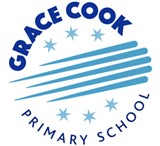Maths
At Grace Cook Primary School, we believe every child can become a confident and capable mathematician. To support this, we use White Rose Maths, a structured, mastery-based approach to teaching mathematics that helps children to understand deeply—not just perform procedures.
Our Intent – Why We Use White Rose Maths
Through White Rose Maths, we aim for our pupils to:
- Develop a strong conceptual understanding of mathematics, not just rote methods.
- Gain fluency—being able to carry out calculations efficiently and accurately.
- Reason and explain their thinking, showing “why” as well as “how.”
- Tackle mathematical problems with confidence and resilience.
- See connections across topics and apply their maths in new contexts.
- Develop positive attitudes to mathematics: persistence, curiosity, and confidence.
Implementation- How White Rose Maths Works
Mastery and “Small Steps” Progression
White Rose Maths uses a mastery approach, meaning we go deep into mathematical ideas rather than rushing through many topics. Pupils are given time to fully grasp each concept before moving on.
Within each topic, the learning is broken down into small steps—these are carefully sequenced so that pupils build understanding one idea at a time.
The CPA Approach (Concrete → Pictorial → Abstract)
To help children internalise maths, lessons follow a Concrete–Pictorial–Abstract (CPA) progression:
- Concrete: using physical objects or manipulatives (e.g. counters, cubes, blocks) to explore a concept
- Pictorial: representing ideas with drawings, diagrams, or visual models
- Abstract: using symbols, numbers and formal notation once the concept is understood
This scaffolded route helps make abstract ideas more accessible and ensures pupils understand, not just imitate.
Fluency, Reasoning, Problem-Solving
Each White Rose lesson includes three pillars:
- Fluency: practising methods until they become secure
- Reasoning: discussing, explaining or proving mathematical relationships
- Problem-solving: applying learning to non-routine, open or challenging tasks
This ensures children don’t just “do” maths—they think, explore, and apply.
What Learning Looks Like Across the Years
- In Early Years / Key Stage 1, children begin with the most concrete experiences: counting objects, comparing, exploring shapes, and number bonds. Gradually they move toward pictorial and abstract methods as understanding grows.
- In Key Stage 2, pupils continue to build upon earlier foundations, work with larger numbers, fractions, decimals, percentages, geometry, measurement, and more complex reasoning. White Rose provides a coherent progression that connects across year groups.
- Topics are organised into blocks (often Autumn, Spring, Summer) which allow sustained focus. Within each block, small steps are sequenced to build mastery.
Impact – What This Means for Grace Cook Pupils
By using White Rose Maths, pupils at Grace Cook experience:
- A deeper, more secure understanding of mathematical concepts—so they don’t just remember but can explain and apply.
- Improved fluency in arithmetic, enabling them to tackle more challenging problems confidently.
- Enhanced reasoning skills: children can justify solutions, spot errors, and compare strategies.
- Resilience and confidence: they learn that making mistakes is part of learning and that working through challenges is rewarding.
- Stronger transfer of skills: pupils can apply their mathematical thinking in new or unfamiliar contexts.
- A positive mathematical mindset: children see themselves as capable mathematicians.
Over time, this means our pupils are better prepared for future mathematical learning, exams, and real-life applications.
Numbots and Times Table Rockstars
At Grace Cook Primary School, we use Numbots (introduced in Year 1) and Times Table Rock Stars (introduced towards the end of Year 2) to support children’s maths learning. These engaging online platforms help pupils build strong number fluency, recall of number facts, and times tables knowledge through fun games and challenges. Both programmes are used in school and at home to provide regular practice and reinforcement. Each child’s log-in details can be found in their reading log so they can access the platforms easily.
How parents can help at home:
-
Encourage your child to use Numbots or Times Table Rock Stars for short, regular practice sessions (around 10 minutes a few times a week is ideal).
-
Celebrate progress and effort, not just scores, to keep motivation high.
-
Use the platforms together occasionally – children often enjoy showing parents how the games work.

